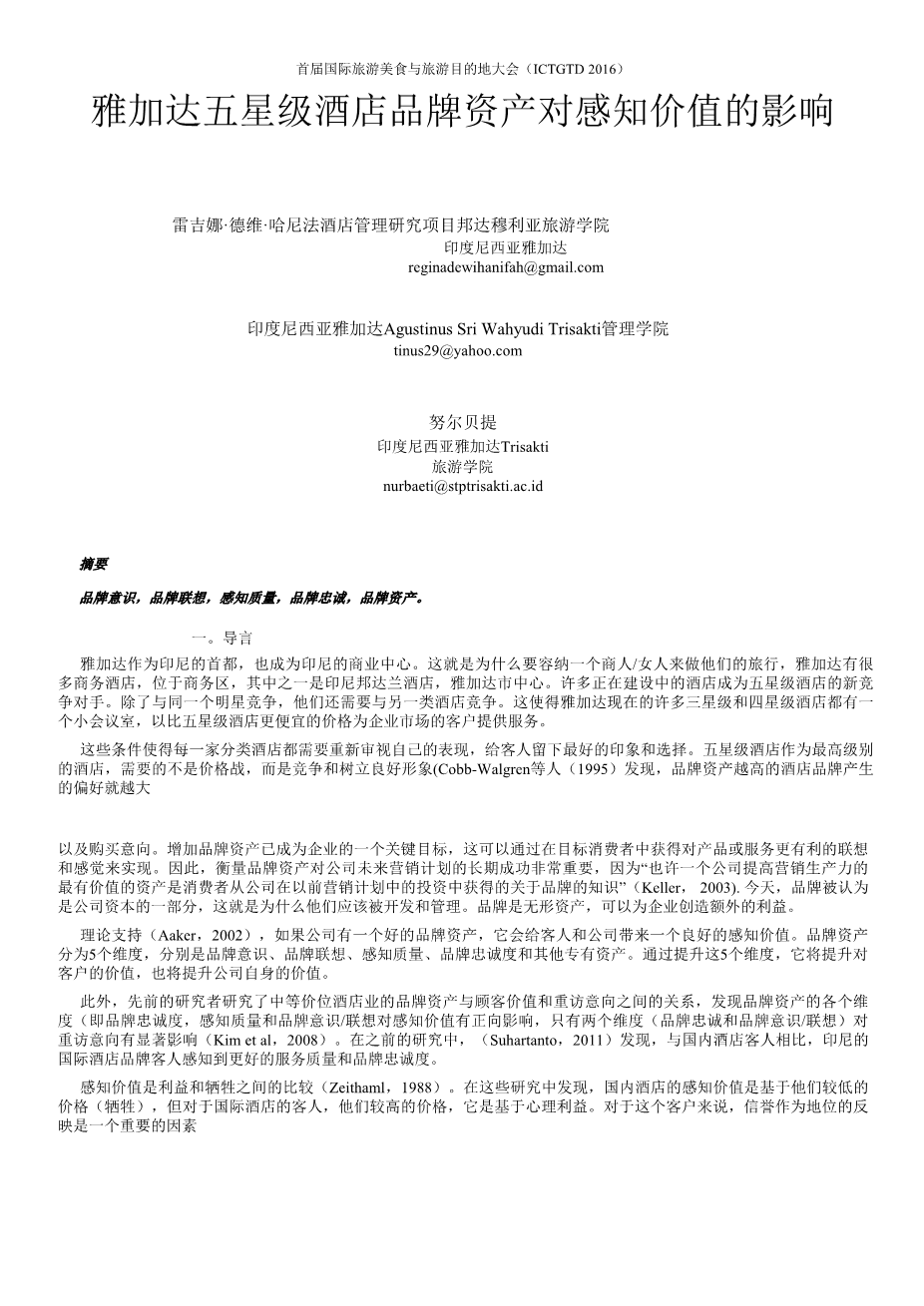1st International Conference on Tourism Gastronomy and Tourist Destination (ICTGTD 2016)
Influence of Brand Equity Towards Perceived Value in 5 Star Hotel at Jakarta
Regina Dewi Hanifah Program Study Hotel Management Bunda Mulia Tourism Academy
Jakarta, Indonesia
Agustinus Sri Wahyudi Trisakti School of Management Jakarta, Indonesia
Nurbaeti
Trisakti Institute of Tourism Jakarta, Indonesia nurbaeti@stptrisakti.ac.id
Abstract—The purpose of this study was to examine hotelrsquo;s brand equity by measuring Aakers four dimensions including brand loyalty, perceived quality, brand awareness and brand association, and to investigate the relationships brand equity and customer perceived value. This research is using quantitative data and using data primer and seconder for this research. The primary data collected from observations, interview and using questionnaire which filled by respondents. The survey was conducted from March – May 2016, with 120 respondents who already stay minimum one time before this stay to measure customer perceived value. The finding of this study showed that the brand equity that has a variable brand awareness, brand association, perceived quality and brand loyalty simultaneously and partially significant effect on Perceived Value guests at 5 star hotels in Jakarta. The most dominant variable towards Perceived Value in this research is the Brand Association.
Keywords—Brand Awareness, Brand Association, Perceived Quality, Brand Loyalty, Brand Equity.
- INTRODUCTION
Jakarta as the capital city of Indonesia also become a business centre for Indonesia. Thatrsquo;s why to accomodate a businessman/woman to do their trip, Jakarta has a lot of Business Hotel which located in business area, one of them is Bundaran Hotel Indonesia, Centre Jakarta. Many hotels construction in progress to become a new competitor for 5 star hotels. Beside compete with a same star, they need to compete with another category hotels. It caused many 3 and 4 star hotels in Jakarta nowadays having a small meeting room also to served customer from Corporate market segment with a cheaper price than 5 star hotels.
Those condition makes each classification hotel needs to review their performance and give the best impression and choose by their guest. 5 star hotel as the highest classification needs to compete and give a good image instead of price war. (Cobb-Walgren et al. 1995) found that the hotel brand with higher brand equity generated significantly greater preference
and purchase intention. Increasing brand equity has become a key objective for firms, which can be achieved through gaining more favorable associations and feelings towards the product or service among target consumers. Hence, measuring brand equity is of great importance to a companyrsquo;s long-term success of future marketing programs since “Perhaps a firmrsquo;s most valuable asset for improving marketing productivity is the knowledge that has been created about the brand in consumersrsquo; minds from the firmrsquo;s investment in previous marketing programs” (Keller, 2003). Today, brands are recognized as part of a companyrsquo;s capital, which is why they should be exploited and managed. Brands are intangible assets that can create added benefits for the business.
It supported with theory (Aaker, 2002), if company has a good brand equity it will give a good perceived value both to the guest and the company. Brand equity divide into 5 dimensions, they are brand awareness, brand association, perceived quality, brand loyalty and other proprietary assets. With enhancing those 5 dimensions it will enhancing a value to customers also for company itself.
Furthermore, the previous researcher studied the relationship between brand equity and guest value and revisit intention in the mid-priced hotel sector, and found that all dimensions of brand equity (i.e., brand loyalty, perceived quality and brand awareness/association) have a positive effect on perceived value and only two dimensions (brand loyalty and brand awareness/association) were found to significantly influence revisit intention (Kim et al, 2008). In previous study, (Suhartanto, 2011) found that International hotel brands guests in Indonesia perceive better service quality and brand loyalty compared with domestic hotel guests.
Perceived value is a comparison between benefit and sacrifice (Zeithaml, 1988). In those study finding indicates that perceived value of domestic hotels was based on their lower rates (sacrifice) but for international hotel guest, with their higher rates, it was based on psychological benefit. For this customer, prestige as a reflection of status is an important
Copyright copy; 2017, the Authors. Published by Atlantis Press.
factor enhancing their social identity. Perceived value is defined as a trade- off between benefits and sacrifies perceived by customers in suppliers offering. The literature reveals that perceived value research is undertaken mostly on goods, while less so on services, particularly on services related to tourism. Further, most research projects are implemented in developed countries, especially in USA, while much less research is done in Europe. Especially with regard to hotel services, the research mostly neglect perceived value as a critical component of overall hotel guestrsquo;s perceived service, although single measurement constructs (e.g., quality, satisfaction) are developed (Bolton and Drew, 1991; Woodruff and Gardial, 1996; Cronin et al., 2000; Ekinci and Riley, 2001).
The developing and understanding of brand equity and perceived value, and how these concepts relate to each ot
剩余内容已隐藏,支付完成后下载完整资料


英语译文共 14 页,剩余内容已隐藏,支付完成后下载完整资料
资料编号:[605496],资料为PDF文档或Word文档,PDF文档可免费转换为Word
课题毕业论文、文献综述、任务书、外文翻译、程序设计、图纸设计等资料可联系客服协助查找。


